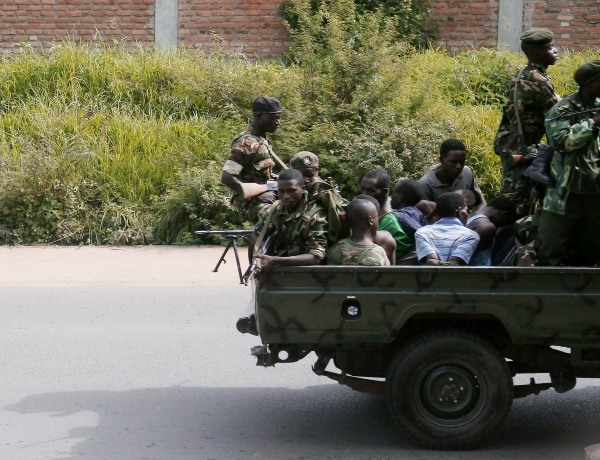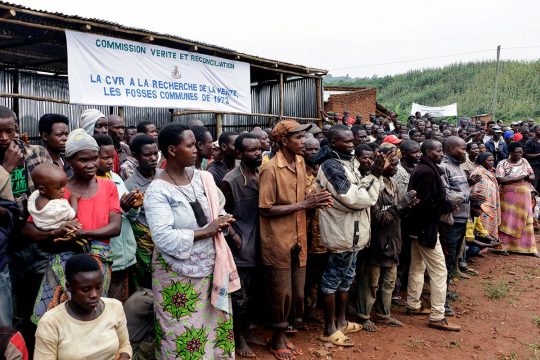Human rights organizations, governments and experts all agree that Burundi is teetering on the brink of civil war, especially after last week’s attacks on military bases in Bujumbura and ensuing repression by security forces, including summary executions. They say urgent, decisive action is needed from the international community.
So far the provisional number of civilian victims in this latest violence is 154 dead and some 150 young people who have disappeared.
The International Federation for Human Rights (FIDH) and Burundi Human Rights League ITEKA on Wednesday called on the United Nations to “urgently send an independent team to investigate these atrocities and who is behind them, and to strengthen the protection of civilians”. They warned there was a high likelihood that international crimes were being committed. In a joint statement the two organizations called on the international community to “wake up to the violence taking hold and act accordingly, notably by adopting measures to stop the recurrence of serious human rights abuses, bring the government to the negotiating table and stop the country sinking definitively into civil war”.
This call came as the UN Human Rights Council meets in extraordinary session this December 17 in Geneva to try to find a response to the violence that has been taking place in Burundi for months now.
In a letter to UN Security Council members, FIDH and ITEKA urged the Council to adopt an emergency Resolution authorizing immediate dispatch of a political mediation team and an international police force, and boosting the mandate and staff of the UN High Commissioner for Human Rights office in Burundi, “in line with recommendations by UN Secretary General Ban Ki-moon on December 1”. The two organizations say the international police contingent should have “enough trained and equipped units to help maintain rule of law and protect civilians”. They say the other components of the Resolution should allow “protection of civilians, a move toward inclusive political dialogue and especially monitoring and public reporting on violations of human rights and hate speech”.
Decisive action
At a press conference on Wednesday, Ban Ki-moon expressed alarm at the "chilling" escalation in violence between government forces and armed fighters. He warned that Burundi is on the brink of a civil war that could engulf the region. "We must do all we can to prevent mass violence and act decisively should it erupt," he said. Ban said the UN may have to boost its presence and activities depending on the situation, and did not rule out the possibility of sending peacekeepers to Burundi.
US Ambassador to the UN Samantha Power called the situation in Burundi "horrific" and urged the international community to act quickly. She stressed that there is currently no dialogue among the parties on the ground, and warned that the conflict could become "more of an ethnic conflict than a political one."
Experts on the African Great Lakes region are also sounding the alarm. Among them is Belgian political science and law professor Filip Reyntjens, who thinks the latest killings may be crimes against humanity and is calling for an independent international inquiry. “According to a lot of information coming from the ground, civilians, young people who were not apparently involved in the attacks on military bases, have been arrested and some of them shot point blank,” said Reyntjens in an interview with JusticeInfo.net. “That’s called summary execution. If that is done with total impunity, the perpetrators of these crimes will perhaps do it again on a bigger scale.”
But what should be done if Burundi rejects the idea of an international investigation team in the country? Reyntjens believes such an investigation is now an absolute necessity, with or without permission from the authorities in Bujumbura.
Not black and white
He says it is dangerous, however, to put sole responsibility for the crimes on the government. “With regard to Burundi, I always warn against painting things in black and white, good and bad, as is so common in this kind of situation,” he said. “In general, it’s those in power who are seen as the bad guys and those struggling against the government who are seen as good! But it’s not the case. It’s not the case in Burundi, nor in any other situation, including past conflicts in the Great Lakes region. We need to realize that there are people on both sides, both the government and its opponents, who are bent on a scorched earth policy and will not hesitate to use violence if they deem it necessary, including against civilians. We need to identify these people. It is not easy and I think that should be part of the mandate of the independent international inquiry I am calling for.”
Professor Reyntjens also evokes the risk of conflict spreading in the region. He says there is evidence that Burundian refugees are being recruited, trained and armed in neighbouring Rwanda for a possible attack on their country. “Even the US which has been one of Kigali’s staunchest sponsors and supporters is getting worried,” Renytjens told JusticeInfo.net. “People in Washington are convinced Rwanda is supporting the recruitment of potential rebels who could attack Burundi from Rwanda. I know that is worrying the Americans and that they are talking to the Rwandans about it, but behind closed doors.”
In a speech in November, Rwandan President Paul Kagame slammed Burundi’s leaders whom he said were “massacring their people from morning to night”. He stressed, however, that Burundians must solve their own problems.






